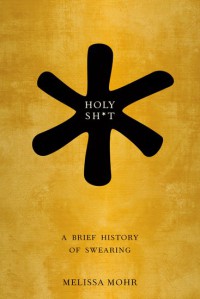I'm sticking an overall "Spoiler" alert on this post as a general warning for anyone who is uncomfortable with the subject of swearing, obscenity or profanity. Just pass this post on by. Also it's REALLY long.
Did I like this book? Fuck yeah!
Seriously though, this is an excellent, concise history of what humanity has considered to be socially unacceptable to say or write since Biblical times. Incredibly easy to read, and written in an accessible style that does justice to the academic research behind it while never taking itself too seriously; I had a really hard time not reading out a great deal of it to MT (and at the same time finding certain passages impossible to read out loud).
Mohr breaks it down to 6 chapters: Roman, Biblical, Middle Ages, Renaissance, 18th/19th centuries and finally "Fuck 'Em All" - modern swearing and where we go from here. She uses the titular phrase as a loose premise: how swearing has moved from the Holy to the Shit and back again through time (because as she explains, all 'swearing' - until the more modern creation of racial slurs - was based either on religious oaths or bodily functions).
I expected the book to start off slow because I find ancient history tedious; full of unfamiliar names and dates I can't keep track of. That certainly wasn't a problem here. Chapter one - To Speak with Roman Plainness was quite possibly the most confronting chapter of the entire book for me. In the Introduction Mohr explains that researchers have found certain swear words cause a measurable physiological response in people; these words induce a greater level of skin conductivity than other emotive words like cancer or death. Chapter 1 had my skin snapping, because the Romans' favourite vulgarity was, - excuse the immaturity but I can't even type it, the c-word - and the author did not share my shyness. In fact this word was possibly used more often than fuck until the Renaissance; the index at the back of the book certainly has more entries for the it.
With skin still twitching, I dove into chapter 2, the Biblical. Wow. Wow because I thought I knew how colourful the Old Testament is but it turns out I didn't. And wow because there's some great theological information here behind oaths - why we take them and why they've always been considered sacrosanct. The broad stokes were nothing new, but the subtleties were eye opening.
The remaining chapters were less of a surprise, but still incredibly interesting. The sub section on Euphemisms in the Victorian age is hysterical. Quick trivia question: What were these words used to describe?:
inexpressibles
indescribables
ineffables
unmentionables
inexplicables
continuations
Answer: Trousers. Victorians couldn't say trousers because they are what covered legs and legs were attached to... at this point any good Victorian woman would have already fallen into a swoon and marriages were likely being arranged to avoid scandal.
It's also the Victorian chapter where I found a word obsolete since 1886 that I am personally going to try to bring back: nackle-ass. Means poor, mean, paltry or inferior and I find it oddly appealing.
The final chapter looks at our modern day embracement of all things Holy and Shit and the rise of a new class of obscenity: the racial slur. She touches on legal rulings of what can and can't be said under the First Amendment and the British hate speech laws and the ambiguity inherent in trying to legislate speech. Mohr wraps up the book with another scientific study showing that swearing when you're injured really does help: researchers have found that subjects plunging their arms in ice water can hold that arm under up to 40 seconds longer if they swear as opposed to saying a neutral word. So next time you stub your toe, let 'er rip - you'll feel better!
It's obvious I loved this book and highly recommend it to anyone curious about our language and its history and has a healthy amount of tolerance for just how bawdy and colourful it can be. I guarantee you'll learn something. :)
